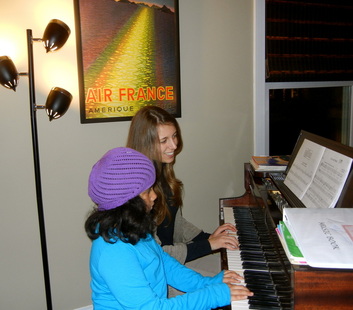
What I Include
There are a lot components incorporated into a music lesson. Ear training, sight reading, theory, technique, scales, exercises, along with repertoire and memorization, all play a key role int he musical education of a student.
I mainly use the Piano Adventure Series by Faber & Faber. They have a nice collection of supplementary books to accompany beginner levels for pop, jazz, holiday, Disney and famous classical music. I also many books that cover oldies (Beatles!!), 90s alternative rock (Nirvana! Foo Fighters!), movie music (John Williams and Harry Potter, Star Wars, Indiana Jones, Superman, etc) and some great hits like Don't Stop Believin'.
The beauty of technology is that if I don't have a song, I can easily find it in a few minutes online and instantly print it out, so pretty much any song imaginable is at our fingertips!
I also encourage students to learn pieces by ear, especially popular music that is heard on the radio. We work together to learn melodies and harmonization techniques to create piano covers of popular songs.
Benefits of Music Lessons
Music is an essential part of life. The benefits of music are endless, and we are all grateful for the beauty of organized sound. Learning an instrument at an early age helps a child use different parts of the brain and multiple senses (visual, aural, touch) all at the same time. Learning a song imprints information in memory better than just rhetorically - who can say the alphabet WITHOUT thinking of the melody to Twinkle Little Star in the background? Music lessons also help with neural growth, developing greater sound discrimination and fine motor skills. Verbal recall, problem solving, test scores and creativity all increase when music is integrated into a child’s life. The greatest rewards from music education are those that can’t be measured. Music students develop greater responsibility and self-discipline by remembering lesson schedules and committing to practice time. They gain confidence when performing in front of an audience and learn a new appreciation for a variety of music. OVerall, students develop a greater sense of awareness - in the massively structured world that we live in, music lessons - particularly private ones - force students to truly think on their own and have complete independence. Both parents and students have access to an enriched lifestyle that sets a path for life-long learning.
Performance Opportunities
I annually hold a recital in late May and early June at the Arlington Heights Library, which provides access to a Steinway piano and stage. Due to the number of students I have, I host 3 recitals and students sign up for one recital, where they perform two pieces. One piece is part of a theme of my choosing (Beatles, Movie Music, 80s Rock, Sonatinas, American Folk Songs, etc), and one is completely of their choosing.
Interested Students:
Interested students can request more information via my contact page.
There are a lot components incorporated into a music lesson. Ear training, sight reading, theory, technique, scales, exercises, along with repertoire and memorization, all play a key role int he musical education of a student.
I mainly use the Piano Adventure Series by Faber & Faber. They have a nice collection of supplementary books to accompany beginner levels for pop, jazz, holiday, Disney and famous classical music. I also many books that cover oldies (Beatles!!), 90s alternative rock (Nirvana! Foo Fighters!), movie music (John Williams and Harry Potter, Star Wars, Indiana Jones, Superman, etc) and some great hits like Don't Stop Believin'.
The beauty of technology is that if I don't have a song, I can easily find it in a few minutes online and instantly print it out, so pretty much any song imaginable is at our fingertips!
I also encourage students to learn pieces by ear, especially popular music that is heard on the radio. We work together to learn melodies and harmonization techniques to create piano covers of popular songs.
Benefits of Music Lessons
Music is an essential part of life. The benefits of music are endless, and we are all grateful for the beauty of organized sound. Learning an instrument at an early age helps a child use different parts of the brain and multiple senses (visual, aural, touch) all at the same time. Learning a song imprints information in memory better than just rhetorically - who can say the alphabet WITHOUT thinking of the melody to Twinkle Little Star in the background? Music lessons also help with neural growth, developing greater sound discrimination and fine motor skills. Verbal recall, problem solving, test scores and creativity all increase when music is integrated into a child’s life. The greatest rewards from music education are those that can’t be measured. Music students develop greater responsibility and self-discipline by remembering lesson schedules and committing to practice time. They gain confidence when performing in front of an audience and learn a new appreciation for a variety of music. OVerall, students develop a greater sense of awareness - in the massively structured world that we live in, music lessons - particularly private ones - force students to truly think on their own and have complete independence. Both parents and students have access to an enriched lifestyle that sets a path for life-long learning.
Performance Opportunities
I annually hold a recital in late May and early June at the Arlington Heights Library, which provides access to a Steinway piano and stage. Due to the number of students I have, I host 3 recitals and students sign up for one recital, where they perform two pieces. One piece is part of a theme of my choosing (Beatles, Movie Music, 80s Rock, Sonatinas, American Folk Songs, etc), and one is completely of their choosing.
Interested Students:
Interested students can request more information via my contact page.
